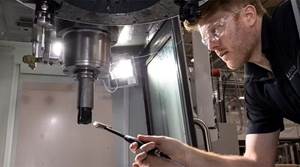Small Milling Tool Accounts For Big Productivity Gain In Machining Forging Dies
Who would have ever thought that such a small mill could so consistently and so reliably finish machine that hardened die steel.
Share





It's hard to say what represents a greater manufacturing challenge—a production run of thousands of pieces or a run, if you can really call it a run, of just one piece. In today's highly competitive world of producing parts for the major automakers, having to make one single part is just as important as churning out thousands. You can't make a mistake. You cannot afford to dawdle over the one part run.
Detroit Drop Die (Romulus, Michigan) has carved out its niche as a supplier of impression dies for forging, often in runs of one, to the auto companies and suppliers to the auto companies. Some of the companies that Detroit Drop Die works for include Webb Forging Co. (Carlisle, South Carolina), a manufacturer of conveyor chains; Pioneer Forge (Pioneer, Ohio), a producer of steering arms and pitman arms for the auto industry; and Keystone Forge (Northumberland, Pennsylvania), a maker of firefighters' axes.
A frequently used steel for dies is FX2 from A. Finkle & Sons Co. Classified as a hot work die steel, FX2 is a nickel-chromium-molybdenum alloy steel with high temperature properties. In addition to its use for forging dies, this steel is also used to make high performance gears, pinions and crankshafts. The very properties that make this such an excellent die material also make it difficult to machine. The dies made by Detroit Drop Die are generally hardened to nearly 38 to 42 Rockwell C.
A typical impression die made by Detroit Drop Die may contain as many as six impressions; in other words, it would be used to forge six raw parts. Standard machining practice of the already hardened die steel, according to Patrick O'Toole, Detroit Drop Die's CNC programmer, is to use a solid carbide mill for the roughing operation and then, past practice dictates the use of another solid carbide mill specially ground for finish machining. These specialty mills, laboriously ground in-house, would impart the 0.020-inch radii required for so many of the forging dies. Alone, the amount of time spent grinding the tiny radii was often prohibitive.
The company was using its Okuma-Howa 10-hp machining center, and the best that it could do with the 0.25-inch diameter solid carbide milling cutter, running with a coolant, was machining at 4.0 ipm at a spindle speed of 2,500 rpm. Depth of cut was set at 0.050 inch. To Mr. O'Toole, that was just too slow. "Besides, regrinding the cutters was very time consuming," he adds. "Also, consistently grinding the right radius was difficult at best. Then, we also had to use a coolant. To make a long story short, there had to be a better way."
Sometimes when things are the most frustrating, fortunes take a turn for the better. As it turns out Carboloy technical representative Manfred Lenz and Mark Jensen from SSC Industrial in Romulus, Michigan, paid a "cold call,"-dropped in unannounced-on Detroit Drop Die. When Mr. O'Toole related the problems he was experiencing with the solid carbide mills, Mr. Lenz and Mr. Jensen convinced him to try a Minimaster from Seco (Detroit, Michigan).
The Minimaster is a versatile milling system with replaceable inserts for grooving, facing, shoulder milling, drilling, chamfering and copying. The holder, made of either 4340 steel or Densimet, a powder metallurgy product consisting of approximately 90 percent tungsten and 10 percent iron and nickel, offers rigidity and vibration damping.
Mr. Lenz and Mr. Jensen recommended the combination of an MM06-0.62-4.3-3 shank fitted with an MM06-0.250-.B90P-M02 precision ground blade. The type MM06-0.62-4.3-3 shank is 0.625 inch in diameter and has a taper of 85 degrees. The MM06-0.250-B90P-M02 is an insert for finish machining. Material grade is F30M, which is specifically designed "for machining of heat-treated steels, stain-less steels and high temperature alloys.
Then, running without coolant, the machining center had no trouble whatsoever taking the same 0.050-inch depth of cut at a slightly higher spindle speed of 2,900 rpm and at 8.9 inches per minute, more than double the previous cutting speed. That's a 122 percent improvement. This significant productivity improvement was not the only reason for switching to the Carboloy product. It is equally important that the tool consistently repeat this performance.
With that sort of productivity and repeatability improvement from the Minimaster now standard operating procedure, Mr. O'Toole comments, "Who would have ever thought that such a small mill could so consistently and so reliably finish machine that hardened die steel. Not only did we cut it faster, but we also saved money and cleanup by not having to use a coolant. We should have investigated the Minimaster earlier." So, what started out as a nothing ventured, nothing gained "cold call" turned into a good business decision for Carboloy and Detroit Drop Die.
Related Content
Toolpath Improves Chip Management for Swiss-Type Lathes
This simple change to a Swiss-type turning machine’s toolpath can dramatically improve its ability to manage chips.
Read MoreHow to Mitigate Chatter to Boost Machining Rates
There are usually better solutions to chatter than just reducing the feed rate. Through vibration analysis, the chatter problem can be solved, enabling much higher metal removal rates, better quality and longer tool life.
Read MoreFinding the Right Tools for a Turning Shop
Xcelicut is a startup shop that has grown thanks to the right machines, cutting tools, grants and other resources.
Read MoreBriquetting Manufacturer Tools Up for Faster Turnaround Times
To cut out laborious manual processes like hand-grinding, this briquette manufacturer revamped its machining and cutting tool arsenal for faster production.
Read MoreRead Next
AMRs Are Moving Into Manufacturing: Considerations for Implementation
AMRs can provide a flexible, easy-to-use automation platform so long as manufacturers choose a suitable task and prepare their facilities.
Read MoreLast Chance! 2025 Top Shops Benchmarking Survey Still Open Through April 30
Don’t miss out! 91ÊÓƵÍøÕ¾ÎÛ's Top Shops Benchmarking Survey is still open — but not for long. This is your last chance to a receive free, customized benchmarking report that includes actionable feedback across several shopfloor and business metrics.
Read MoreMachine Shop MBA
Making Chips and 91ÊÓƵÍøÕ¾ÎÛ are teaming up for a new podcast series called Machine Shop MBA—designed to help manufacturers measure their success against the industry’s best. Through the lens of the Top Shops benchmarking program, the series explores the KPIs that set high-performing shops apart, from machine utilization and first-pass yield to employee engagement and revenue per employee.
Read More






















